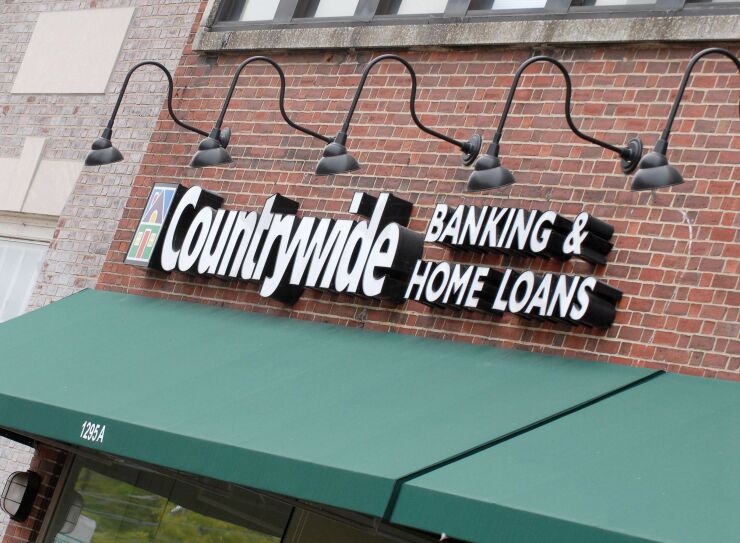Bank of America is facing off in court with the bond insurer Ambac Financial Group in a $2.7 billion case that's one of its last legal hangovers from the subprime crisis.
Countrywide Financial, which Bank of America acquired amid the mortgage lender's 2008 collapse, was the "worst of the worst" in underwriting securities backed by bad loans in the years leading up to the crisis, a lawyer for Ambac said Wednesday in opening arguments in New York state court. The insurer is seeking to recover billions of dollars it paid out on those bonds.
"Blinded by sheer greed, it ran a factory where it literally churned out billions and billions of dollars in bad mortgage loans," Ambac lawyer Michael Carlinsky said of Countrywide. "It didn't care about the quality of those mortgage loans because it was passing the risk on to others."

Bank of America has already paid more than $50 billion to resolve regulatory probes and litigation stemming from its $4 billion purchase of Countrywide. The Ambac suit, which was first filed in 2010, is among the last the bank is still facing from the financial meltdown, but the stakes are potentially much higher for the insurer.
"A recovery in the $2 billion range (out of $2.7 billion sought) would be meaningful for a company like Ambac whose market cap of $675 million is a fraction of that," Bloomberg Intelligence senior litigation analyst Elliott Stein said.
'Everyone knew'
The trial before Manhattan Supreme Court Justice Robert Reed is expected to last nearly two months. Ambac claims Countrywide violated contracts governing 17 securitizations of home loans between 2004 and 2006 by flouting underwriting guidelines and passing on risks to the insurer. According to Ambac, Countrywide's leadership, including Chief Executive Angelo Mozilo, knew the majority of its mortgages were questionable but pushed employees to approve them as part of a goal to originate one out of every three home loans in the U.S.
"The company had a strategy from the top down to the bottom, and the folks on the ground were implementing this strategy to originate as many loans as they could without regard to quality and get them out as quickly as they could," Carlinsky said.
But lawyers for Countrywide said Wednesday that Ambac performed its own risk analysis when it agreed to insure the bonds for $25 million a year in premiums.
"What did Ambac know about these loans? The answer is, from the get-go, everyone, including Ambac, knew the loans in these securitizations had significant payment risks," Enu Mainigi, a lawyer for Countrywide, said in opening statements.
'100-year flood'
"They were rated by the ratings guys as junk or near-junk," she said. "This was known to everybody before Ambac signed on these securitizations. Ambac's role in these contracts was to be the credit enhancer — to make it less risky to the investors because Ambac was standing behind it with its insurance."
Mainigi also argued that Ambac's losses were caused by the broader financial crisis and resulting economic downturn, not any action by Countrywide or its management. Many homeowners who would not have otherwise defaulted did so because of the deep recession, and subprime loans were some of the first to stop paying, she said.
"Ambac had to cover the losses it promised to cover and it was paid to cover," Mainigi said. "It's not because of anything Countrywide did. They stopped paying because the equivalent of a 100-year flood came to the economy."
Federal prosecutors launched of criminal investigation of Mozilo in 2008 but dropped it without bring charges a few years later. The Justice Department also told him in June 2016 they had abandoned a civil case against him. The former CEO paid a $67.5 million penalty to the Securities and Exchange Commission in 2010 without admitted or denying wrongdoing.
Stein said Ambac is likely to win the trial, partially based on a precedent set in a similar suit filed by the bond insurer MBIA in 2009 against Credit Suisse Group. A judge last year ordered Credit Suisse to pay $604 million and the bank later agreed to pay that amount to resolve the dispute. But Stein said Countrywide will have good arguments on appeal based on broad nature of Ambac's arguments.
The case is Ambac v. Countrywide, 651612/2010, New York State Supreme Court, New York County (Manhattan.)





